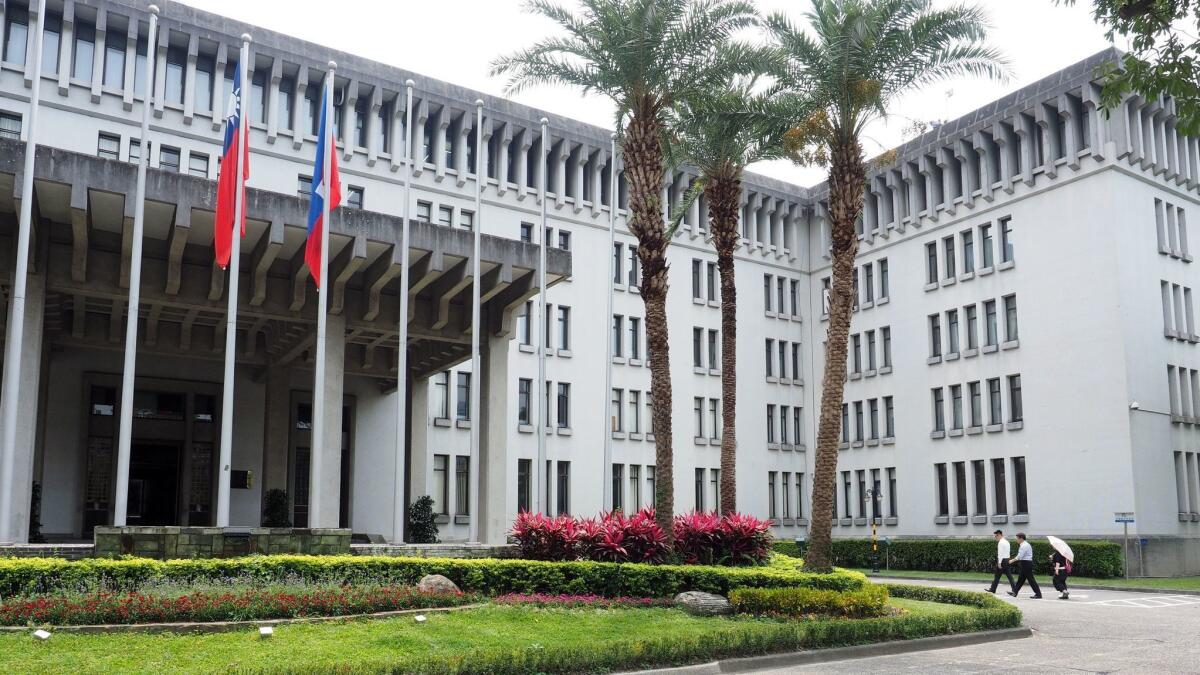Taiwanese in U.S. targeted by fraudsters. Could the calls be coming from China?

- Share via
Reporting from TAIPEI, Taiwan — Hundreds of Taiwanese people living in the United States, including many in Los Angeles, have gotten chilling telephone calls in recent months from scam artists falsely claiming to represent government agencies and aggressively demanding payments to settle problems, the Taiwanese government warns.
Although the reports suggest the motive is fraud, officials in Taipei have not ruled out a political cause. The callers speak with mainland Chinese accents, Foreign Ministry spokesman Andrew Lee said.
The fraudsters often claim to be representatives from Chinese or Taiwanese government agencies and demand bank transfers to clear cases involving back taxes, kidnappings or health insurance irregularities. The cases are fake, and the bank accounts involved belong to private people rather than government agencies.
Callers sometimes allege “issues such as errors on visa or passport application documents,” the Taipei Economic and Cultural Office in Los Angeles said in a statement in January.
Taiwan’s representative offices in nine U.S. cities have received reports of the calls.
“New York and Los Angeles are big cities with ethnic Chinese populations, so I’m afraid it’s easy for fraud networks to reach their targets there,” Lee said Tuesday at a news conference in Taipei, noting that Chinese speakers who are not Taiwanese had also gotten calls. “If you randomly make calls, you’ll easily reach an ethnic Chinese person.”
The scams are sometimes successful. Losses have ranged from $1,000 to a life savings of $660,000, police investigators in Taiwan said.
“If the person called asks for details, whoever is on the other end of the line will become very harsh, and sometimes elderly people get really scared,” Lee said. Some Taiwanese in the United States have received email threats, too, he said.
The number of reports surged in May, Lee said, and the office in New York once took 300 distress calls in one day.
In Los Angeles, the government’s Taipei Economic and Cultural Office has received nearly 100 reports of these phone calls since January, office spokesman Kent Yang said.
Fraud rings led by Taiwanese but employing mainland Chinese typically work in Africa, Southeast Asia and parts of Europe where setup costs are low and locations hard to trace, police said. They normally look for victims in China.
Those networks may be calling the United States from overseas or using bases in the United States as police in the other countries catch on, said Liao You-lu, a criminal investigation professor at Central Police University in Taiwan. Ethnic Chinese in the United States also tend to have more money than potential victims elsewhere, and speak Chinese like the fraudsters, he said.
Some Taiwanese in Southern California said they had taken calls claiming to come from a local Chinese consulate or other Chinese government bodies. Some report getting robocalls over the last year.
China claims sovereignty over Taiwan, though the two sides have been self-ruled since the Chinese civil war of the 1940s. Over the last two years China has used military, diplomatic and economic pressure against Taiwanese President Tsai Ing-wen, who disputes Beijing’s view that both sides fall under a single flag.
The tense relations between Beijing and Taipei could influence how any fraud cases are prosecuted.
The Beijing government, citing its sovereignty claim, has asked that third-party countries send any Taiwanese suspects to China, where they face stiffer prison sentences than Taiwanese courts might hand down. Hundreds of Taiwanese suspects have been sent by other countries to China since 2016 — over the Taiwanese government’s protests.
It’s unclear whether the United States would send Taiwanese suspects to China, Liao said. “Because China is getting ever stronger in catching these people, they’re going to other countries where it’s safer,” he said.
If U.S. police agencies catch Taiwanese behind the suspicious calls, Beijing will probably ask Washington that they too be sent to China, said Raymond Wu, managing director of the Taipei-based political consultancy e-telligence. “That’s always been [China’s] position, and they will likely continue.” A refusal in Washington would add to Sino-U.S. political frictions, he said.
Taiwan’s representative offices have turned over the reports to U.S. police agencies, Lee said. The offices do consular work and organize trade and cultural events. Because Washington recognizes Beijing over Taipei diplomatically, Taiwan is not allowed to set up formal embassies in the United States.
Jennings is a special correspondent. Times staff writer Frank Shyong in Los Angeles contributed to this report.
More to Read
Sign up for Essential California
The most important California stories and recommendations in your inbox every morning.
You may occasionally receive promotional content from the Los Angeles Times.










